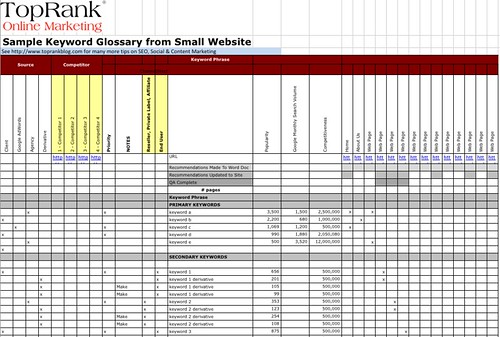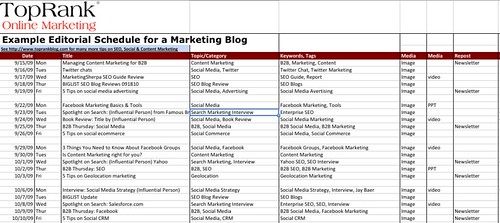 It’s funny when you work in an industry for a long time that the basic things you create to make life a little easier can save others who are new to the field, a lot of time. I’ve done a few webinars and speaking events in the past few months where one of the tools suggested was a Keyword Glossary (spreadsheet) for managing category and page level optimization, keyword mapping and competitor keyword mapping.
It’s funny when you work in an industry for a long time that the basic things you create to make life a little easier can save others who are new to the field, a lot of time. I’ve done a few webinars and speaking events in the past few months where one of the tools suggested was a Keyword Glossary (spreadsheet) for managing category and page level optimization, keyword mapping and competitor keyword mapping.
Another tool was an Editorial Plan that documents articles/blog posts, media, promotion and planned re-purposing. There are basic building blocks for becoming more efficient with search engine optimization tasks, but I’ve received a lot of requests for them. I thought they might be useful to our readers to use for inspiration to create their own and maybe even modify and mashup into something better.
Below are screen shots which you can click to see larger versions.
After conducting research using one of the various keyword research tools, organizing that information in a useful format like a Keyword Glossary helps SEOs manage their on page optimization and it brings a measure of accountability as well. The example of above shows a matrix of competitors sites that have been optimized for the target phrases, a list of primary and secondary phrases with measures of popularity and competitiveness. The phrases are also mapped to category levels or individual pages so you know which pages are being optimized for what keywords.
It’s no mystery that we like blogs as an online marketing, Social, SEO and content marketing tool. Planning content through an editorial calendar (as a magazine other publication would) is essential for producing content that is of interest to the target audience, that represent target keywords, and keeps authors on track and flush with ideas on what to write about.
The spreadsheet above shows dates for publishing, titles, keywords, categories, media used, cross-posting, promotion channels/tactics and future re-purposing of the content. Organizing an editorial plan like this helps online marketers gain maximum value for their investment into content creation and also makes curation more valuable.
The best tool or format depends on your own needs and applications. That’s why I don’t link to the actual spreadsheets – at least part of the reason. 🙂
However, will be making the actual spreadsheets available at BlogWorld New York. Be sure you check out my sessions if you’re attending those events.
What kinds of templates have you created for managing SEO and content marketing tasks?




